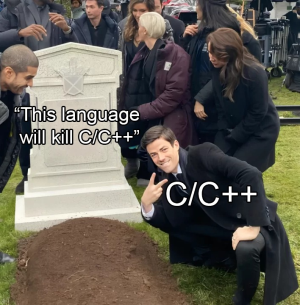C (Programming Language)
C/C++: The Programming Language That Refused to Die
In the sprawling graveyard of “soon-to-be-dead” programming languages, C and C++ stand defiant, waving their banners of pointers and memory management. Every few years, a flashy new language emerges, heralded as the next big thing that will finally send C and C++ to their eternal rest. Rust? Sure, it’s safer. Python? Easier. Go? Snappier. And yet, like an old Jeep that keeps chugging along with duct tape and sheer stubbornness, C and C++ remain functional, unkillable, and—dare we say—essential.
Out of Style, Yet Unstoppable
Let’s be honest: C and C++ aren’t winning any beauty contests. These languages are verbose, cranky, and unapologetically complex. Writing a C++ program can feel like assembling IKEA furniture with a poorly translated manual—except your compiler will yell at you when you get it wrong.
But here’s the thing: they work. And they’ve been working since the 1970s. Need to build an operating system? C’s got you. Want to create a game engine that squeezes every ounce of performance from your hardware? C++ is already doing that. Need a low-level library to make your shiny new language faster? Well, surprise—C is in there too.
"PHP is C++ for the Web"
If C is the sturdy Jeep, PHP is like its weird cousin—a Jeep that someone decided to convert into a food truck. It’s messy, it’s loud, and it sometimes smells like bad decisions, but you can’t deny its utility. Like C++, PHP refuses to die because it’s deeply ingrained in its domain. Sure, people complain about it, but the internet would grind to a halt without its spaghetti-coded magic.
The New Kids on the Block
The headlines are relentless:
And yet, here we are. For every flashy new language with memory safety, garbage collection, or asynchronous this-and-that, C and C++ are like, “Cool story, bro. I’ll still be here running your kernels, powering your graphics, and handling your embedded systems.”
Why Won’t They Die?
- Raw Power C and C++ are fast. Not "kinda fast," but "blisteringly fast," with minimal overhead. When milliseconds matter, you’re going to reach for these old-timers.
- Legacy Code The world runs on C and C++. Your bank, your car, your toaster—odds are, there’s some C/C++ in there. Rewriting all that code in Rust? Good luck explaining the budget to your boss.
- Versatility From microcontrollers to supercomputers, there’s no terrain C and C++ can’t traverse. They’re the Swiss Army knives of programming languages.
- Sheer Momentum With decades of tooling, libraries, and community support, why reinvent the wheel? Especially when that wheel is a C library that’s already been debugged a thousand times over.
C and C++: The Jeep of Programming
C and C++ are the ol’ reliable Jeep of programming languages. They’re not sleek like a Tesla or fancy like a Ferrari, but they’ll get you where you need to go, no matter how rough the terrain. Sure, they might not have power steering or air conditioning (read: modern safety features), but who needs that when you’ve got control over every bolt in your vehicle (or byte in your memory)?
So, to the shiny new languages of the world: Welcome to the party. C and C++ have been here for decades, and they’ll probably be here long after you’ve been forgotten. After all, why kill what isn’t broken?
